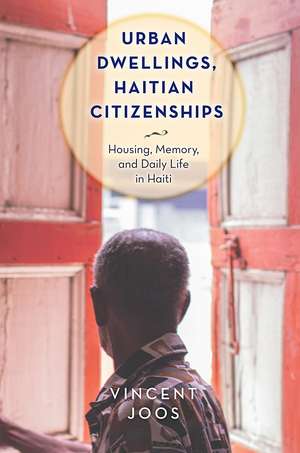Urban Dwellings, Haitian Citizenships: Housing, Memory, and Daily Life in Haiti: Critical Caribbean Studies
Autor Vincent Joosen Limba Engleză Paperback – 10 dec 2021
Din seria Critical Caribbean Studies
-
 Preț: 283.83 lei
Preț: 283.83 lei -
 Preț: 258.06 lei
Preț: 258.06 lei -
 Preț: 203.79 lei
Preț: 203.79 lei -
 Preț: 243.85 lei
Preț: 243.85 lei -
 Preț: 245.95 lei
Preț: 245.95 lei -
 Preț: 185.09 lei
Preț: 185.09 lei -
 Preț: 318.70 lei
Preț: 318.70 lei -
 Preț: 334.71 lei
Preț: 334.71 lei -
 Preț: 210.64 lei
Preț: 210.64 lei -
 Preț: 204.10 lei
Preț: 204.10 lei -
 Preț: 253.93 lei
Preț: 253.93 lei -
 Preț: 314.72 lei
Preț: 314.72 lei -
 Preț: 346.99 lei
Preț: 346.99 lei -
 Preț: 262.40 lei
Preț: 262.40 lei -
 Preț: 316.55 lei
Preț: 316.55 lei -
 Preț: 366.31 lei
Preț: 366.31 lei -
 Preț: 361.12 lei
Preț: 361.12 lei -
 Preț: 370.28 lei
Preț: 370.28 lei -
 Preț: 362.28 lei
Preț: 362.28 lei - 23%
 Preț: 778.68 lei
Preț: 778.68 lei -
 Preț: 359.13 lei
Preț: 359.13 lei - 23%
 Preț: 779.75 lei
Preț: 779.75 lei -
 Preț: 251.36 lei
Preț: 251.36 lei -
 Preț: 218.16 lei
Preț: 218.16 lei - 10%
 Preț: 910.98 lei
Preț: 910.98 lei - 10%
 Preț: 910.98 lei
Preț: 910.98 lei -
 Preț: 267.04 lei
Preț: 267.04 lei - 10%
 Preț: 910.98 lei
Preț: 910.98 lei -
 Preț: 360.09 lei
Preț: 360.09 lei - 10%
 Preț: 910.98 lei
Preț: 910.98 lei -
 Preț: 359.04 lei
Preț: 359.04 lei - 51%
 Preț: 498.27 lei
Preț: 498.27 lei -
 Preț: 405.13 lei
Preț: 405.13 lei
Preț: 323.83 lei
Nou
Puncte Express: 486
Preț estimativ în valută:
61.97€ • 64.83$ • 51.47£
61.97€ • 64.83$ • 51.47£
Carte indisponibilă temporar
Doresc să fiu notificat când acest titlu va fi disponibil:
Se trimite...
Preluare comenzi: 021 569.72.76
Specificații
ISBN-13: 9781978820586
ISBN-10: 1978820585
Pagini: 240
Ilustrații: 10 b-w, 10 color images
Dimensiuni: 156 x 235 x 13 mm
Greutate: 0 kg
Editura: Rutgers University Press
Colecția Rutgers University Press
Seria Critical Caribbean Studies
ISBN-10: 1978820585
Pagini: 240
Ilustrații: 10 b-w, 10 color images
Dimensiuni: 156 x 235 x 13 mm
Greutate: 0 kg
Editura: Rutgers University Press
Colecția Rutgers University Press
Seria Critical Caribbean Studies
Notă biografică
VINCENT JOOS is an assistant professor of anthropology and global French studies at Florida State University in Tallahassee.
Cuprins
List of Illustrations
Introduction
1 Developing Disasters: Dispossession and Industrialization in Northern Haiti
2 Industrial Futures: Abstract and Disciplinarian Landscapes in Post-Earthquake Haiti
3 State Interventions: Infrastructure and Citizenship
4 Inhabiting Port-au-Prince after 2010: Indigenous Urbanization, History, and Belonging
5 Daily Life in the Shotgun Neighborhoods of Downtown Port-au-Prince
6 Demolishing Shotgun Neighborhoods
Conclusion: Peyi a Lok
Acknowledgments
Notes
References
Index
Introduction
1 Developing Disasters: Dispossession and Industrialization in Northern Haiti
2 Industrial Futures: Abstract and Disciplinarian Landscapes in Post-Earthquake Haiti
3 State Interventions: Infrastructure and Citizenship
4 Inhabiting Port-au-Prince after 2010: Indigenous Urbanization, History, and Belonging
5 Daily Life in the Shotgun Neighborhoods of Downtown Port-au-Prince
6 Demolishing Shotgun Neighborhoods
Conclusion: Peyi a Lok
Acknowledgments
Notes
References
Index
Recenzii
"Joos’ Urban Dwellings, Haitian Citizenships undertakes a monumental task—analyzing the failures of international aid and post-disaster reconstruction through the lens of urban housing. Arguing for embodied forms of dwelling, Joos compellingly argues for Haitian models of urban housing built upon communal living, vernacular architecture, and sustainable habitation. Through his intimate, empathic ethnography, Joos powerfully asserts a 'right to the city' (and the country) through spatial citizenship, a correlate to what Mimi Sheller (Island Futures) defines as mobile justice."
"Urban Dwellings, Haitian Citizenships is a tour de force, arguing for the importance of place in belonging and citizenship. Exceptionally well-researched, weaving a rich and diverse set of first-hand accounts with scholars from Haiti and elsewhere, Joos brings a critique of foreign disaster capitalism to the highest level, pushing hard against sensationalist narratives."
"Richly narrated ethnographies accompanied by well-documented urban projects convey Joos’ principal argument: that culturally anchored practices related to reciprocal networks, income-generation (ti komés), social organization, and vernacular dwelling typologies (structures that withstood the earthquake on most occasions), are socially, economically and ecologically sustainable forms of urbanism that may offer viable alternatives to conventional post-disaster rehabilitation trajectories and internationally sponsored urban planning that turn a blind eye to ‘what already is.’"
Descriere
Urban Dwellings, Haitian Citizenships explores the failed international reconstruction of Port-au-Prince after the devastating 2010 earthquake. It describes how, in the meantime, people from various backgrounds use, transform, and create vibrant urban spaces and economies that enable them to rebuild their lives. By exploring how the state, international organizations, and everyday people transform the environment,the book reflects on the possibilities of dwelling in post-disaster landscapes.
